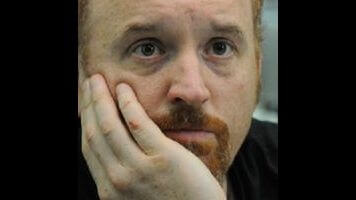As Louis CK’s signature stand-up routine conveys, we live in a golden age yet people nevertheless find reasons to be not just unhappy but miserable. To cite an example from CK’s act, it is now possible for anyone with four hundred dollars to soar through the air while seated upon a majestic throne like an airborne man-God. But do people thank the heavens for such miraculous technology? No, they merely complain bitterly if they aren’t able to access Wi-Fi during their flight.
We live in a world of infinite wonder. We are surrounded by beauty and brilliance and truth yet we nevertheless make full use of our inalienable right to complain. The opening to "Country Drive" offers a variation on this theme when Louie is taking his two daughters for a car trip out to the country to visit an ancient great-aunt they've never met (they're dazzled to learn she doesn't even have a phone, let alone an email account) and one of the girls complains that she’s bored.
In the way of children, this begins as a simple complaint until it develops an almost musical, jazz-like sense of repetition; she’s intent on seeing how many minor variations she can spin on the mantra, “I’m bored.” How is it that small children tire quickly of just about everything except complaining about how bored they are?
CK counters by pointing out the wonders all around them; a beautiful sky, amazing nature and best of all, the magic of a human mind capable of just about anything yet somehow interested in incredibly little. As if all that weren’t exciting enough, the world is littered with human time capsules that can tell you what the world was like before computers and airplanes and the Internet.
The irritating musicality of the migraine-inducing symphony of “I’m bored” is soon joined by CK’s own weird little riff. In a wonderfully masturbatory sequence, CK spends a seeming eternity rocking out to a song on the radio, playing air guitar in decidedly Jack Black-like patterns and generally behaving with a glorious dearth of self-consciousness. There’s an inverse relationship between how cool CK’s character thinks he looks (or at least the rock-star poses he's dutifully recreating) and how gloriously lame he actually comes off. Then again, no one looks cool rocking out in their car. No one.
CK posits the great-aunt they’re about to visit as a human wonder, a link to a lost and mysterious world. Alas, it doesn’t take long for Louie’s great aunt to resurrect one of the less admirable hallmarks of olden times: blatant racism. Louie’s great aunt starts slowly by referring to a treat as a “Nigger Toe.” Louie is tempted to give her the benefit of the doubt: she’s old, after all, and we expect/angrily demand a certain level of antiquated intolerance from the senior set.
But it soon becomes apparent that this is no mere slip of the tongue: this is an ugly, hateful, racist old woman whose bigotry is anything but accidental. Age does not heap wisdom upon us all: it’s entirely possible to grow old without learning a goddamned thing.
At this point the show builds into a meditation on the nature of language, meaning and age. Instead of the usual bifurcated, two-part structure, this is devoted entirely to a single linear narrative and rather than begin with stand-up, this begins with an endless car ride, segues into the visit during the middle segment and ends on a bravura extended stand-up comedy riff on those nasty little motherfuckers Tom Sawyer and Huckleberry Finn and Huckleberry Finn’s favorite word (here’s a hint: it is often associated with Huckleberry's friend Jim).
CK has railed against the cowardice of using “the N word” elsewhere but it’s still incredibly jarring hearing “nigger” used over and over and over again in an all-white context. It's also a little jarring watching the great aunt croak as soon as she'd served her narrative purpose. That felt a little cheap and more than a little easy.
But there was never a sense that CK was using that most notorious of slurs simply to be shocking or provocative; no, CK had a bigger game in mind. Like George Carlin or Chris Rock before him, he wants to take hurtful words apart (he's similarly a big fan of "cunt") and figure out why they get under our skin and trouble us so. He’s a casual deconstructionist and “Country Drive” is casually brilliant in its analysis of how language, intent and meaning change and evolve over time.
Stray Observations
—In every Louie there are things that are weird and wrong for reasons it's hard to put a finger on. In this episode, that was the wood paneling in auntie's house and those weird children dressed in adult clothing.


 Keep scrolling for more great stories from A.V. Club.
Keep scrolling for more great stories from A.V. Club.